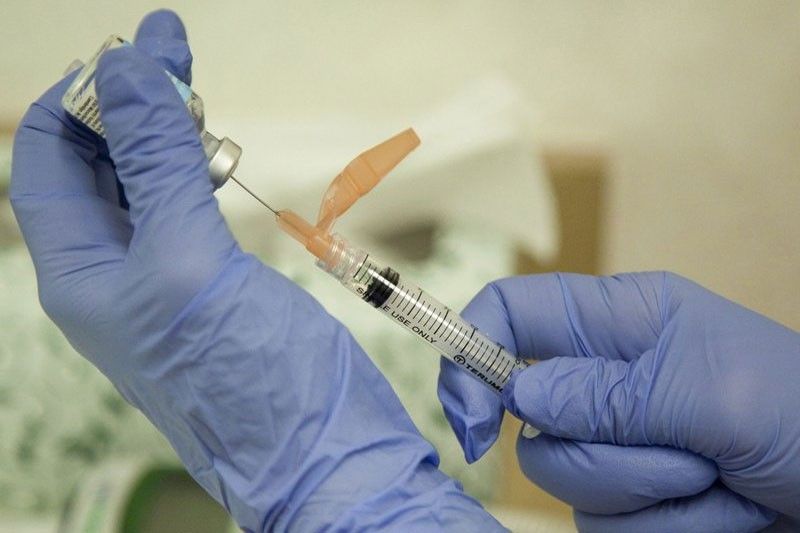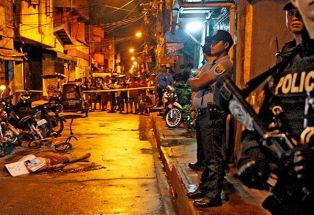Mandatory immunization ordered

MANILA, Philippines — In response to the measles outbreak, the government will exert all efforts to ensure that Republic Act 10152 or the Mandatory Infants and Children Health Immunization Act of 2011 is properly implemented, Malacañang said yesterday.
“The Duterte administration recognizes that this is a public health issue that needs to be urgently addressed, which is why we are focused on ensuring that the provisions of RA 10152 are properly implemented,” Secretary to the Cabinet Karlo Nograles said yesterday.
Nograles cited Section 3 of the law, which mandates the government to provide immunization for free at any government hospital or health center to infants and children up to five years old.
The mandatory basic immunization under RA 10152 covers measles and other vaccine-preventable diseases such as tuberculosis; diphtheria, tetanus and pertussis; poliomyelitis; mumps; rubella or german measles; hepatitis-B, and H. influenza type B or HIB.
Aggressive information drive
Following the President’s directive, Secretary Martin Andanar of the Presidential Communications Operations Office said the PCOO would work with the Department of Health (DOH) in crafting a plan for the information campaign.
“We will assist Health Secretary Francisco Duque III in formulating their communications plan to promote the government’s immunization program,” Andanar said.
The DOH said about two million children are at risk of contracting these diseases due to low vaccination rate in the last two years.
Andanar directed government media stations such as the PTV-4, Presidential Broadcast Service, Philippine News Agency, Philippine Information Agency and Radio Television Malacañang to assist the DOH.
“The communications’ plan is on top of the full access to use the PTV, PBS, PNA, PIA, RTVM and the Presidential Communications we are giving Secretary Duque and the DOH,” Andanar said.
At a Cabinet meeting on Wednesday, Duque attributed the low vaccination rate to the scare caused by the Dengvaxia controvery.
Nograles said the directive for the DOH to step up the information drive is consistent with Section 4 of the immunization law, which mandates the government, non-government organizations, professional and academic societies and local government units to distribute appropriate information materials to the public.
“So, it is clear in the law that we need to mobilize the entire government machinery as well as our partners in the health sector in informing the public that immunization is provided for free by the government, that it is safe and needed to protect the children,” Nograles said.
“This is the only way to address the current measles outbreak, abate its spread in more areas and prevent the occurrence of another one in the future,” he added.
No penal provision
Nograles said the government could neither force parents to have their children vaccinated nor punish them if they have not.
“RA 10152 does not have any penal provisions and does not punish parents who do not have their children vaccinated, unlike the PD (presidential decree) it replaced. Under PD 996, it was the duty of parents or those having custody of the child to see to it that the child is immunized. Those who did not could be punished with a P200 fine or one month imprisonment,” he said.
The government does not need to resort to extreme measures to address the measles outbreak, Nograles said.
He said local government units play a very critical role in the implementation of the program, down to the grassroots level.
Alarmed
The United Nations Children’s Fund (UNICEF) along with Filipino pediatricians as well as experts on infectious diseases have expressed alarm over the measles outbreak in the country.
“Reported incidences of death and illnesses in children from the vaccine-preventable disease is unacceptable,” the UNICEF said, citing reports that over 20,000 measles cases were recorded as of December 2018.
The figure represents a 500 percent increase compared to last year’s data.
UNICEF Philippines deputy representative Julia Rees said the country is among the top 10 nations with the highest incidence of measles, along with Nigeria, Pakistan and the Democratic Republic of Congo, from May 2017 to April 2018.
It is estimated that 2.5 million Filipino children aged five and below who did not receive the vaccine for measles remain at risk of getting the disease.
The UNICEF said while measles is a serious and highly contagious disease, it can be prevented by vaccination.
Rees said that “population immunity can be achieved by 95 percent or higher coverage and outbreaks prevented.”
“Unfortunately in the Philippines, the coverage for routine immunizations is only 55 percent, despite the fact that anti-measles vaccine is available free in government facilities,” Rees said, adding that the measles vaccine is safe and effective and had been successfully used in the Philippines for more than 40 years.
She said measles in children is deadly and can cause long-term complications and disabilities, which can seriously impede their development and potentials.
“I urge parents and communities to take their children to the health center to be immunized,” Rees said.
Meanwhile, the Philippine Pediatric Society (PPS), the Pediatric Infectious DIsease Society of the Philippines (PIDSP) and the Philippines Society for Microbiology and Infectious Disease Inc. (PSMID) have drummed up the need to curb the measles outbreak.
In separate statements, the groups highlighted the importance of immunizing eligible children against vaccine-preventable diseases.
The PPS and PIDSP have asked their members to help spread information that vaccines are safe and highly effective and can reduce morbidity and mortality against infectious diseases.
The PSMID said that pregnant women and patients with low immunity could not receive live virus vaccines like MMR or mumps-measles and rubella.
Negros measles cases up
Measles cases in Negros Occidental increased by 3,333 percent in January this year compared to the same period last year.
Provincial health officer Ernell Tumimbang blamed the increase on the Dengvaxia controversy that has scared parents from having their children vaccinated.
The DOH has declared a measles outbreak in Western Visayas, including Negros Occidental and Bacolod City, along with other areas in the Visayas and Luzon.
Tumimbang said that measles cases in Negros Occidental from Jan. 1 to 26 rose to 103 from three in the same period last year.
Negros Occidental had the most number of measles cases in the region last month.
Tumimbang said the surge begun in August, from relatively low numbers in the first half of 2018.
There were 370 measles cases in Negros Occidental in 2018 or an increase of 1,380 percent from the 25 cases posted 2017, he said.
Tumimbang urged mothers to have their children vaccinated for measles.
Health workers and teachers were urged to help explain to parents the importance of having children protected from measles by having them vaccinated. – With Sheila Crisostomo, Gilbert Bayoran
- Latest
- Trending




























